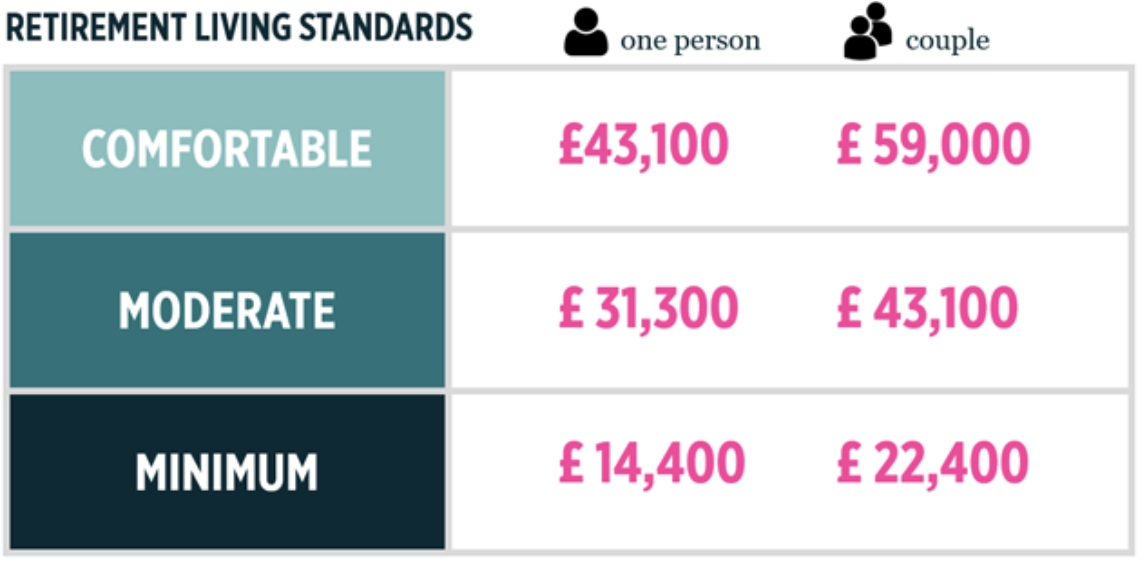The income a couple needs in retirement to sustain a 'Moderate' lifestyle has leapt by £9,100 in the last year - up nearly 30%, according to new Retirement Living Standards estimates out today from the Pensions and Lifetime Savings Association (PLSA).
A single person would need 34% more retirement income to maintain the same 'Moderate' lifestyle as last year, equivalent to £8,000 more.
The dramatic annual increases in the widely quoted figures have been revealed today in the latest Retirement Living Standards report from the pension provider trade body.
The amounts have climbed partly because of inflation but also because people’s priorities have changed following the pandemic, the PLSA said.
The report said people were placing increasing importance on spending time with family and friends out of the home, which brings its own extra costs.
Professor Matt Padley, co-director of the Centre for Research in Social Policy at Loughborough University which calculated the figures, said: “Expectations about living standards in retirement continue to change in subtle ways.
“In this year’s findings we see the strong effects of rising prices in what’s needed to meet the cost of food and energy. Following the Covid pandemic, this latest research highlights a pronounced need and enthusiasm among the public for shared experiences beyond the confines of their homes, including activities like eating out and holidays.”
The report looked at the expected cost of three retirement lifestyles: Minimum, Moderate, and Comfortable. Research was based on multiple in-depth discussions with members of the UK public.
The 'Minimum' retirement living standard is the same as the Joseph Rowntree Foundation’s Minimum Income Standard (MIS) and reflects what members of the public think is required to cover a retiree’s needs, not just to survive but to live with dignity – including social and cultural participation.
It includes around £95 for a couple’s weekly groceries, a week’s holiday in the UK, eating out about once a month and some affordable leisure activities about twice a week. It does not include the budget to run a car.

• Retirement Living Standards - Income Levels Required. Source: PLSA
In the latest update, the cost of a 'Minimum' standard of living in retirement has climbed from £12,800 to £14,400 for a single person (up 12.5%) and from £19,900 to £22,400 for a couple (up 12.5%).
The 'Moderate' retirement living standard, in addition to the Minimum lifestyle, provides more financial security and more flexibility. For example, a couple could spend around £100 a week on groceries, £60 a week on eating out, run a small second-hand car, have a week holidaying in Europe and a long weekend break in the UK.
In the past year 'Moderate' income costs have increased by £8,000 from £23,300 to £31,300 (up over 34%) for a single person and by £9,100 from £34,000 to £43,100 for a couple, (up nearly 27%).
The level saw significant changes in the expectations of what should be included. For example, the in-depth discussion groups considered that people should be able to help their family members financially with a budget of £1,000 (to assist with the cost of grandchildren activities, for instance), as well as an additional £100 per month to take family members out for a meal.
At the 'Comfortable' retirement living standard, retirees expect more luxuries like regular beauty treatments, theatre trips and a two week holiday in Europe a year. A couple could spend around £130 per week on groceries and £80 a week per couple on meals out. A key change was that the research groups determined that a couple required just one small second-hand car (a three-year-old, five-door Ford Fiesta replaced every five years) rather than the two cars which featured in previous years (which also included a mid-range SUV).
At the Comfortable level, the cost of living increased from £37,300 to £43,100 for one person (up 18%) and from £54,500 to £59,000 for a two-person household (up nearly 9%).
Nigel Peaple, director policy & advocacy, PLSA, said: “The cost-of-living has put enormous pressure on household finances over the last year and, as the research shows, this is no different for retirees.
“It’s important for workers saving for retirement to remember the standards are not prescriptive targets, they are a tool to help you engage with the type of spending you think you will do in retirement and to help you plan for it.”
The PLSA said the higher cost of living in retirement underscored the urgent need for reform of the workplace savings system.
Former Pensions Minister and leading pensions commentator Steve Webb, a consultant at LCP, called the latest PLSA figures “a wake-up call” to government and industry.
He said: “These latest estimates of the budgets we will need in retirement are a wake-up call to government and the pensions industry alike. Despite a significant increase in the State Pension last April, the State Pension rate is actually further away from providing a decent minimum standard of living now than it was a year ago.
"Meanwhile the cost of a moderate lifestyle in retirement has surged by nearly one third. Yet at the same time the government is still dithering about whether and when to implement a set of modest increases to the amount being saved into pensions under the automatic enrolment rules. Without urgent action we are likely to see more and more people facing an unenviable choice between an extended working life or a poor retirement."

